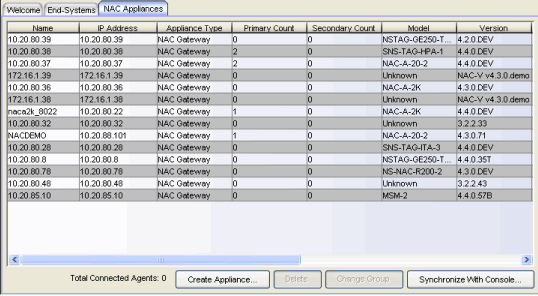The NAC Appliances tab is displayed in the right panel when you select the All NAC Appliances folder in the left panel. The tab is also available when selecting an engine group in the left panel. The tab displays a table of information about the engines in the folder or group. Right-click an engine for a menu of options.
Use the table options and tools to find,
filter, sort, print, and export information in a table and customize table settings. You can access the Table
Tools through a right-mouse click on a column heading or anywhere in the table
body, or by clicking the Table Tools
 button in the
upper left corner of the table (if you display the row count column). For more information, see
Table Tools.
button in the
upper left corner of the table (if you display the row count column). For more information, see
Table Tools.
| NOTE: | The NAC Appliance administration web page allows you to access status and diagnostic information for an Extreme Access Controlengine. Launch the administration web page by right-clicking on an Access Control engine in the left-panel tree and selecting
WebView. You can also access the administration web page using the following URL:
https://<Access ControlengineIP>:8444/Admin. The default user name and password for access to this web
page is "admin/Extreme@pp." Change the username and password in the Web Service
Credentials field on the Credentials Tab in the Appliance Settings window. |
|---|
Click the graphic for more information.

- Appliance Type
- The Access Control (NAC) engine type: NAC Gateway, NAC Layer 2 (L2) Controller, or NAC Layer 3 (L3) Controller.
- CPU Load (0-100%)
- The percentage of the engine's CPU currently being used. This value gives you an indication of how busy the engine is and helps you determine if your network needs additional engines, or if you need to change your network configuration so that the load is more evenly distributed among your existing engines.
- Capacity
- The engine's current capacity, which is the number of end-systems authenticated within the last 24 hours out of the maximum number of authenticating end-systems supported for the engine.
- Create Appliance Button
- Opens the Create NAC Appliance window where you can create and configure a new engine.
- Delete Button
- Select an engine and click this button to delete the engine from NAC Manager's device database. When you perform the delete, you can also delete the engine from Console.
- Change Group Button
- Select one or more engines and click this button to open a window where you can choose a new engine group for the selected engines. When you click OK, the engines are automatically moved to the new group.
- Synchronize with Console Button
- Opens the Synchronize Appliances with Console window where you can import and export engines to and from Console.
For information on related windows: